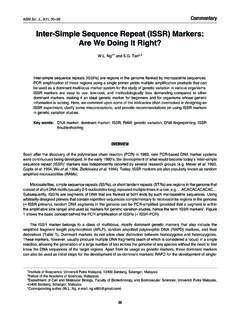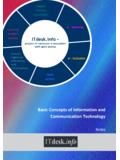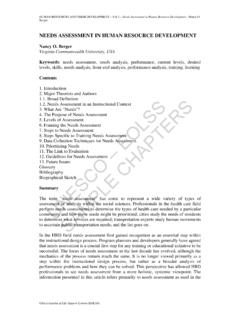Transcription of STEM education: Issues, tensions and challenges
1 STEM education and the curriculum: Issues, tensions and challenges Massimo Amadio Senior Programme Specialist unesco IBE International STEM High-level Policy Forum on Evidence-based Science Education in Developing Countries , Kuala Lumpur, 26-27 May 2015 INTERNATIONAL STEM HIGH-LEVEL POLICY FORUM EVIDENCE-BASED SCIENCE EDUCATION IN DEVELOPING COUNTRIES , 26-27 MAY 2015, KUALA LUMPUR, MALAYSIA 2 IBE 1949 (12th session of the ICE, Introduction of natural science in primary schools) develop the scientific spirit of observation and experiment; develop the intellect by the use of activity methods based on observation and experiment and by undertaking group research; foster all activity tending to protect and conserve nature; correlated with the teaching of other subjects if taught as separate subject. 1952 (15th session of the ICE, Teaching of natural science in secondary schools) modern life requires everyone to have a common core of basic scientific knowledge and the study of natural science is also important for the development of moral qualities; important for adopting a scientific method and develop general culture and sensitiveness; pay attention to regional needs and potential, focus on actual problems, allow teachers to use local resources, use activity methods and start from concrete cases instead of abstract laws; safeguarding nature; encourage students to express their thoughts in correct and precise language; taught by well-qualified teachers and in coordination with other subjects.
2 unesco and science, technology and mathematics Source: Recommendations of International Conference on Education (IBE archive and webpage). INTERNATIONAL STEM HIGH-LEVEL POLICY FORUM EVIDENCE-BASED SCIENCE EDUCATION IN DEVELOPING COUNTRIES , 26-27 MAY 2015, KUALA LUMPUR, MALAYSIA 3 IBE 1950 (13th session of the ICE, Introduction to mathematics in primary schools) essential for objective and accurate judgment; exercises and problems be taken from everyday life and related to the child s environment; taught step by step also paying attention to verbal expression and correct vocabulary; allow for practical and group activities; associated as closely as possible with other subjects; is one of the most difficult subjects. 1956 (19th session of the ICE, Teaching of mathematics in secondary schools) undisputed cultural and practical value and an important role in scientific, technical and economic progress and in world prosperity; essential part of the education of a modern person; no reason to believe that girls are less able to study mathematics than boys; necessary to understand the real-life problems raised by technical, economic and social activities; also serve to increase accuracy, clarity and concision of language; learning by active participation and being aware of its applications; allowing students to question and discover and to develop their reasoning skills instead of learning by heart, foster individual research as much as team work; teachers acting as leaders and guides.
3 unesco and science, technology and mathematics Source: Recommendations of International Conference on Education (IBE archive and webpage). INTERNATIONAL STEM HIGH-LEVEL POLICY FORUM EVIDENCE-BASED SCIENCE EDUCATION IN DEVELOPING COUNTRIES , 26-27 MAY 2015, KUALA LUMPUR, MALAYSIA 4 IBE Regional conferences of Ministers of Education and those responsible for economic planning (Singapore, Mexico City, Harare, Abu Dhabi, Sofia in the 1970s and early 1980s) stressed the importance of adequate science education equip future citizens for an increasingly scientific and technological world, offering an opportunity to explore their environment logically and systematically. 1984 (39th session of the ICE, Renewal of primary education in the perspective of an appropriate introduction to science and technology) develop scientific attitudes, creativity, a critical approach, objectivity and precision, and acquire basic scientific and technical knowledge; develop positive attitudes towards science and technology, understand and be sensitive to the purposes and social implications of new technologies and scientific applications, develop sound attitudes to nature; the approach should be as interdisciplinary as possible, based as far as possible on active methods, observation and experimental methods; ensure integration of concepts and ideas of science and technology into the content of other subject areas; out-of-school experiences and extra-curricular activities should be organized.
4 unesco and science, technology and mathematics Source: Recommendations of International Conference on Education (IBE archive and webpage). INTERNATIONAL STEM HIGH-LEVEL POLICY FORUM EVIDENCE-BASED SCIENCE EDUCATION IN DEVELOPING COUNTRIES , 26-27 MAY 2015, KUALA LUMPUR, MALAYSIA 5 IBE Science and technology education increasingly emphasized A sound foundation of science and technology education among the citizens of a country is an absolute prerequisite for its economic development and ability to compete with other nations ( unesco -IBE, 1987) Value creation depends increasingly on a better use of knowledge, whatever the level of development, whatever its form and whatever its origin ( unesco 2010) More engineering professionals will be required to address the sustainable development issues, for example the development of renewable energy sources, advancements in technology, solutions for sustaining the environment and improving healthcare ( unesco 2010) Sources: unesco -IBE, Science and technology in the primary school of tomorrow, Geneva-Paris 1987.
5 unesco , Science Report, Paris, 2010; unesco , Engineering: Issues, challenges and opportunities for development, Paris, 2010. INTERNATIONAL STEM HIGH-LEVEL POLICY FORUM EVIDENCE-BASED SCIENCE EDUCATION IN DEVELOPING COUNTRIES , 26-27 MAY 2015, KUALA LUMPUR, MALAYSIA 6 IBE STEM disciplines are increasingly viewed as essential for work and citizenship ( science for all ). Economic policy agenda driven by the need to enhance the quality of human capital in general and enlarge the high skill base for research, innovation and effective response to technological change ensure long-term, sustainable economic growth and competitive advantage (growth in terms of the overall wellbeing of the population and not only the wealth of economy) STEM-based learning and disciplines are also seen as essential to support effective learning in non-STEM areas (creativity, critical thinking, problem solving, communication, ) and to become competent and capable citizens in a technology-dependent society and globalized world STEM-related issues.
6 A central concern of policy makers INTERNATIONAL STEM HIGH-LEVEL POLICY FORUM EVIDENCE-BASED SCIENCE EDUCATION IN DEVELOPING COUNTRIES , 26-27 MAY 2015, KUALA LUMPUR, MALAYSIA 7 IBE Generally conceived in human capital terms, but also with a focus on increasing scientific and technological literacy Promote a positive image of science and mathematics (and STEM) and increase public knowledge and awareness of science Support increased student engagement and participation (in school-based and tertiary-level STEM disciplines and workforce) as well as increased learning achievement in STEM disciplines Address gender disparities and under-representation of specific groups in STEM disciplines and workforce Establish coordination mechanisms across ministries, agencies, organizations, stakeholders, programmes and initiatives STEM policies: some common features INTERNATIONAL STEM HIGH-LEVEL POLICY FORUM EVIDENCE-BASED SCIENCE EDUCATION IN DEVELOPING COUNTRIES , 26-27 MAY 2015, KUALA LUMPUR, MALAYSIA 8 IBE STEM: evolving curricular and pedagogic approaches From to innovative approaches Discipline-based Integrated, interdisciplinary Knowledge-based & content-led (memorizing abstract concepts) Practice-based & process-led (solving real-world problems) Didactic transmission (passive, rote learning) Interactive, engaging (active, experiential learning) Individual work Collaborative, team-work Reproduction (simply applying procedures) Adaptation / Transformation (acting creatively) Conformity / Compliance Critical interpretation & action For future scientists (somewhat elitist ) For future citizens ( science for all ) INTERNATIONAL STEM HIGH-LEVEL POLICY FORUM EVIDENCE-BASED SCIENCE EDUCATION IN DEVELOPING COUNTRIES , 26-27 MAY 2015, KUALA LUMPUR, MALAYSIA 9 IBE Example.
7 Integrated science and science subjects (early 2000s) Biology of countriesgrade levelChemistry of countriesgrade levelPhysics INTERNATIONAL STEM HIGH-LEVEL POLICY FORUM EVIDENCE-BASED SCIENCE EDUCATION IN DEVELOPING COUNTRIES , 26-27 MAY 2015, KUALA LUMPUR, MALAYSIA 10 IBE STEM is an heterogeneous cluster of subjects (it may include health professions, agriculture, computing, medicine, environment-related fields, depending on the country); issues are not necessarily the same for each discipline There is a lack of international standardized data, especially for the upper secondary level STEM fields of study Paradox of decreasing student interest and participation in STEM disciplines the more the country is developed and industrialized and the more they progress in education There are gender disparities and imbalances and issues related to limited participation of specific groups (for example, indigenous people) in STEM study and occupations; stereotypes and well-rooted beliefs ( STEM disciplines are hard and only for the talented, mathematics is only for a few) STEM education alone is not enough to enable and support innovation STEM: issues, tensions and challenges (1) INTERNATIONAL STEM HIGH-LEVEL POLICY FORUM EVIDENCE-BASED SCIENCE EDUCATION IN DEVELOPING COUNTRIES , 26-27 MAY 2015, KUALA LUMPUR, MALAYSIA 11 IBE Knowledge (content) becomes rapidly obsolete and outdated.
8 At the same time, the level of detail within each discipline has become unmanageable: defining the basics is challenging Innovation increasingly requires collaborative and interdisciplinary knowledge (and in a globalized world this involves intercultural understanding and collaboration) Integrated and interdisciplinary approaches to STEM disciplines can be problematic (teachers insufficiently prepared, strong traditional disciplinary boundaries, low status of integrated learning areas compared to single ) tensions : between early and late specialization/streaming; between early differentiation into several disciplines and integration into broad learning areas; between traditional pedagogical approaches and competency-based STEM: issues, tensions and challenges (2) INTERNATIONAL STEM HIGH-LEVEL POLICY FORUM EVIDENCE-BASED SCIENCE EDUCATION IN DEVELOPING COUNTRIES , 26-27 MAY 2015, KUALA LUMPUR, MALAYSIA 12 IBE Median instructional time (in accumulated number of hours) allocated to mathematics and science over the first nine years of schooling, by EFA region (early 2000s, 113 countries) Mathematics 6026686498255496736210100200300400500600 700800900 Arab StatesAsia & thePacificCentral &EasternEuropeLatinAmerica &theCaribbeanNorthAmerica &WesternEuropeSub-SaharanAfric aGlobalScience INTERNATIONAL STEM HIGH-LEVEL POLICY FORUM EVIDENCE-BASED SCIENCE EDUCATION IN DEVELOPING COUNTRIES , 26-27 MAY 2015, KUALA LUMPUR, MALAYSIA 13 IBE How to.
9 Define the basics Select the content Deal with integration and specialization Promote effective collaboration between scientists and teachers Attract and retain sufficient numbers of STEM graduates into the teaching profession Ensure that decisions regarding STEM disciplines are taken in a context of comprehensive approach to the curriculum as a whole STEM and the curriculum: some open questions INTERNATIONAL STEM HIGH-LEVEL POLICY FORUM EVIDENCE-BASED SCIENCE EDUCATION IN DEVELOPING COUNTRIES , 26-27 MAY 2015, KUALA LUMPUR, MALAYSIA 14 IBE In recent years different organizations, including partnerships and consortia, have defined and endorsed key competences or core skills frameworks using different emphases, groupings and terminologies. This may contribute to generating ambiguity and uncertainty. Competences, competencies, 21st century INTERNATIONAL STEM HIGH-LEVEL POLICY FORUM EVIDENCE-BASED SCIENCE EDUCATION IN DEVELOPING COUNTRIES , 26-27 MAY 2015, KUALA LUMPUR, MALAYSIA 15 IBE key competences, competencies, competences, cross-curricular competencies, generic competencies, transversal competencies, core competencies, basic essential skills, basic skills, foundation skills, core skills, cross-curricular skills, life skills, key skills, 21st century skills 21st century general/essential capabilities, transversal capacities, citizenship skills, overarching learning 4 Cs, 7Cs soft and hard skills ways of thinking, ways of working, tools for working, living in the world cognitive and non-cognitive skills INTERNATIONAL STEM HIGH-LEVEL POLICY FORUM EVIDENCE-BASED SCIENCE EDUCATION IN DEVELOPING COUNTRIES , 26-27 MAY 2015, KUALA LUMPUR, MALAYSIA 16 IBE Why competences?
10 Profound transformations in the economy and society (knowledge economy) Globalization (commerce, finances, economy, increasing interdependence) ICT development Progressive shift of attention from educational inputs to outcomes (from access to learning) A more integrated approach to learning not only academic knowledge and cognitive development, but also social and emotional learning, values, ) and growing attention devoted to the applied dimension of what has been learned Most competences frameworks emphasize: Collaboration, Communication, Digital literacy-ICT, and Social and civic competences; Many frameworks also make reference to: Creativity, Critical thinking, and Problem solving. INTERNATIONAL STEM HIGH-LEVEL POLICY FORUM EVIDENCE-BASED SCIENCE EDUCATION IN DEVELOPING COUNTRIES , 26-27 MAY 2015, KUALA LUMPUR, MALAYSIA 18 IBE The most emphasized competences (88 countries) 0%20%40%60%80%100%CommunicationSocial competenceProblem solvingCreativityDigital competence (ICT)NumeracyCivic competenceCollaborationCritical thinkingEntrepreneurshipLiteracyBasic competences in science and technologyInformation processing and enquiry skillsLearning to learnEnvironmental awarenessINTERNATIONAL STEM HIGH-LEVEL POLICY FORUM EVIDENCE-BASED SCIENCE EDUCATION IN DEVELOPING COUNTRIES , 26-27 MAY 2015, KUALA LUMPUR, MALAYSIA 19 IBE Issues relating to competences Depending on the context, the same competences can be interpreted in many different ways ( critical thinking , creativity )


